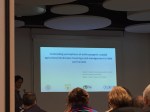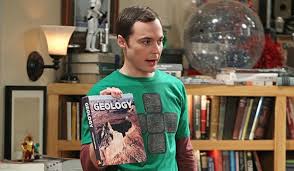
Day two is over and it was another great day! The weather was beautiful today, really tempting people out of the conference centre and into the lovely Vienna, but luckily there were also lots of brilliant talks to draw people … Continue reading


Day two is over and it was another great day! The weather was beautiful today, really tempting people out of the conference centre and into the lovely Vienna, but luckily there were also lots of brilliant talks to draw people … Continue reading

We’re here!! Day one of #EGU16 has been and gone and wow was it a cracker! I got to attend lots of interesting sessions today, starting off with the ‘Geoethics: theoretical and practical aspects from research integrity to relationships between … Continue reading
It’s that time of year again – Vienna is full of confused looking geologists, people are trying to spot the maximum number of poster tubes on a plane and everyone is wearing jazzy blue lanyards – yes the European Geosciences Union General Assembly 2016 or #EGU16 has arrived!!

The only book you need during EGU – what if your phone battery dies!?!?!
Now you may have searched your keyword using the EGU app or flicked through the online programme. Maybe you got here early today and have already highlighted your sessions in the information and schedules book, but just in case you are looking for something a little out of the ordinary, here are five sessions that you may have missed…
1. Multifractals and singularity analysis in mineral exploration and environmental assessment (Monday 18th, 17.30-19.00, Rm -2.47)
Nonlinear modelling studies may not sound like everyone’s cup of tea, but who knew you could use fractals and singularity analysis to learn more about mineral resources?!? If that doesn’t belong on a future episode of the Big Bang Theory, I don’t know what does.

Sheldon’s interactions with geology should be more fun – maybe fractals are the way!! (Image credit BigBangTheory wiki)
2. Rhyme-your-research I: composition (Tuesday 19th, 12.15-13.15, Rm -2.85)
As it is international Haiku Day, I thought it was totally appropriate to highlight this session on turning your work into art, or in this case poetry. This session on turning your work into poetry is convened by Dr Sam Illingworth who performs his science inspired poetry on his regular Periscope broadcasts.
3. Join us! Community experiments in water science by using open data and software (Wednesday 20th, 12.15-13.15, Rm 2.15)
Open access, open science and open data are subjects under much discussion at present in the scientific community and this session provides an active opportunity to get involved with opening your science to the public. The session proposes to offer pop-up presentations to the audience about software and data that anyone can use and should give an interesting insight into how we can use and promote open access data and research.
4. Promoting and supporting equality of opportunities in geosciences (Thursday 21st, 13.30-17.00, Rm -2.16)
Another visible issue in science today is the role of equality (gender, cultural and national). As questions of the value of diversity in our research institutions are difficult to address when cloaked in silence, this very valuable session will focus both on the obstacles to inclusion and the concrete actions we can take to increase diversity and acceptance in the lab, the field and the office.
5. Geoscience processes related to Fukushima and Chernobyl nuclear accidents (Friday 22nd, 10.30-15.00, Rm -2.47)
Whilst nuclear accidents such as Fukushima and Chernobyl are often the most visible part of the nuclear energy industry, but they also represent truly interdisciplinary studies that include soil science, atmospheric science, hydrology, natural hazards and ecosystems. By comparing historical accidents such as Chernobyl to more recent events such as Fukushima we are able to much better assess the potential impact of nuclear materials on our environment.
Finally I have to end with a plug – a session that I am co-convening is also running on Friday, called Geoscience for Society: collaborative research management and communications strategy (15.30-17.00, Rm -2.16). It’s a session combining issues of project management and geoscience communication used as a tool to address some of the major issues in society today and is DEFINITELY worth a visit.
So what do you think? Any other sessions that have caught your eye this week?
I can’t tell you how many of my fellow PhD students, at one time or another, have mentioned recognising that moment when someone describes impostor syndrome to them for the first time.
‘Hang on, you mean that feeling that you are about to be discovered as a fraud who hasn’t worked hard enough, isn’t smart enough and is about to be publicly shamed and cast out of your research institution, is an actual thing? And I’m not the only one who feels this way?!’
Yes impostor syndrome, the crushing fear of being found out, seems to be a pretty universal PhD experience, much like sleepless nights and having moments of extreme hatred for your computer. But there an interesting aspect of this that I recently realised – and that is the experience of impostor syndrome for the interdisciplinary student. The reason that it’s different for interdisciplinary students is because, in a way, you actually ARE an impostor in your new subject. In my field I know that I can hold my own with geology, and am confident defending my position, but I only started studying psychology as a PhD student – my contemporary psychology PhDs have a depth of knowledge from their undergraduate and masters degrees that I just don’t have.
This lack of background knowledge makes it very difficult for me to argue my position, as I automatically assume that the person who has an opposing view knows better than I do, so they must be right. I get extremely stressed when I have to present my work for an audience that has a psychologist in it, and immediately loose confidence in my work – just waiting for someone to stand up and yell ‘that’s rubbish!’ from the back of the room.
Of course I know that this reaction is illogical. I have worked hard to study my adopted subject, and read as widely around my area as possible. My research is interesting and has been successfully peer reviewed. I know that it is extremely unlikely that anyone will stand up during a presentation and yell at me and in fact any time I have presented to psychologists they have been amazingly supportive, helpful and encouraging, with great suggestions.
But that doesn’t stop the fear.
What I have gradually learned to do during my PhD is grab that fear by the neck and march myself over to people with interesting, alternative, challenging or more advanced knowledge and ask them to talk about my studies. I frequently feel my inadequacy during these conversations, but ALWAYS come away understanding my research better. It’s uncomfortable, but rewarding and I wish that I had done it more often during my PhD. Forcing yourself to examine the weakest area of your studies is one of the things I think makes a great scientist – if your work won’t stand up to criticism then it’s not worth as much, in my opinion. None of us wants to be told that years of work are irrelevant or unsubstantiated, but I would rather find that out as part of a dialogue, than be presented with it at a later stage. I hope that as I progress as a researcher I won’t let fear of being a subject impostor hold me back from questioning my research and continuing to learn.
So that one day I won’t be an impostor any more, in either of my subjects.